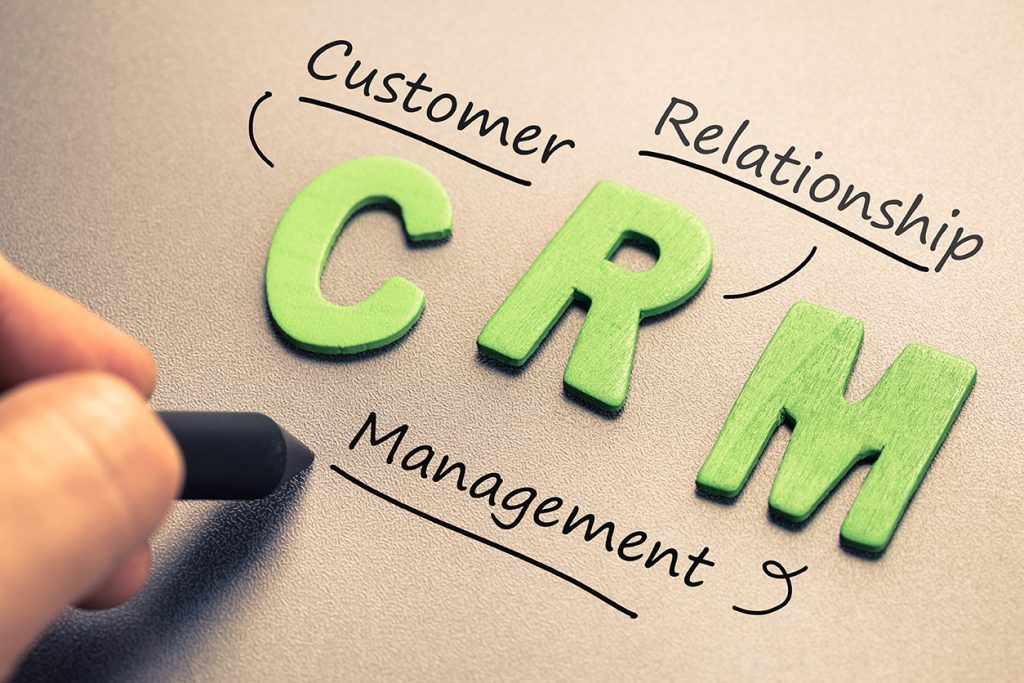
There is no denying the pressures of working life in today’s modern business world. How do we ensure we are communicating enough with our clients and prospects? How do we make sure we are following up on all our opportunities and making the most of our sales funnel? How can we manage relationships with our customers effectively when we all have so many constraints on our time and resources? How can we engender customer loyalty and maintain long-term relationships with our customers in a world where they are more inclined than ever before to move from supplier to supplier?
The answer is far from clear cut, but one solution may be the implementation of a CRM (Customer Relationship Management) system.
What is a CRM System?
CRM has become a huge buzzword in the commercial sphere. Research experts, Gartner, predict that by 2021, CRM will be the single largest revenue area of spending in enterprise software.
Leading CRM provider, Salesforce.com, explains:
“At its simplest definition, a CRM system allows businesses to manage business relationships and the data and information associated with them…With CRM, you can store customer and prospect contact information, accounts, leads, and sales opportunities in one central location, ideally in the cloud so the information is accessible by many, in real time”.
Without leaving the CRM system, you can also view contact information, follow up via email, manage tasks, and track sales performance. Implementing the right CRM can increase sales efficiency and can assist in closing more deals and in improving forecast accuracy.
How Do I Choose a CRM System for my Business?
When tasked with choosing a CRM system it is not an exaggeration to say it’s an absolute minefield – from Salesforce, Agile CRM, Act!, ActiveCampaign, Zoho, Hubspot, Odoo, Pipedrive, Microsoft Dynamics and Sugar CRM to name a few, the list is endless. Every system has its own unique selling points and claims to be the saviour of all CRM systems. Then there are all the potential integrations with other systems and apps that by the end can literally leave you feeling totally bewildered, confused and unsure if you can decide at all! How do you choose I hear you ask? These systems can be expensive, and it is imperative that you have carried out the necessary research before you jump in to a system headfirst!
Before you drown in the sea of options consider the following:
- Ease of Use: For us at Genie Insights it is a prerequisite that the CRM platform is user friendly and can be navigated intuitively. Do you feel comfortable using it? Is it aesthetically easy on the eye? Is everything easy to find?
- Budget: How much are you willing to spend? CRM systems can range from free to thousands of pounds a month. Are there any hidden costs? What are the differences/restrictions between packages on systems with tiered pricing models? Make sure you contact the supplier for a total price breakdown.
- Implementation: Is it quick and easy to implement? What other software/apps do you want the CRM system to integrate with?
- Functionality: What will be the main function of the CRM system? Will it be sales process orientated, for example, logging contacts, accounts, opportunities, reports and sales pipeline management or do you need it to be more focused on the email marketing/marketing automation side? Do you want to concentrate on building email marketing campaigns and a deep analysis of their performance? Or do you want an all-singing all-dancing system that does both equally well? Your business has unique requirements so what is it that you want the CRM system to improve? You need to know what you want to get out of it before you make any decision – these goals need to be in line with your overall business strategy. Some CRM systems also facilitate case management, whereby customer feedback can be allocated for follow up and management. Do you prefer a cloud-based or server-based solution?
- Org Size / Industry Suitability: How many users do you require? How many records do you have in your database? Some systems are better suited to organisations of a certain size or are targeted at specific industries.
- Customisation Capability: Is the system customisable or is it restricted to the ‘out-of-the-box’ functionality and fields? What can be customised? What cannot? Some companies will be easily pleased with standard options, but others will have very specific demands for the system that may not be easily managed with basic fields and processes.
- Support Available: Can you request a live demo or a free trial? What scope is there for training? Does the system have regular new releases/developments? Is it constantly trying to develop, improve and innovate the user experience? What support is there if you have a problem later on? What are the support response times like?
- User Reviews: Read up on reviews for customer service, usability etc. Get App has a really handy comparison tool.
CRM – What’s in it for us?
Once you have researched the options and have decided on your CRM system, how do you sell the concept to the rest of the organisation? What’s in it for you and your employees/colleagues?
The fundamental benefits of introducing a CRM system are:
- Customer Data Management: In today’s marketplace accurate customer data is ‘king’ and an organisation with a well-managed, regularly updated CRM system encompassing strict customer data management guidelines is more likely to thrive and survive!
- Increased Sales Productivity and Organisation: Wave goodbye to Excel spreadsheets, post-it note reminders and paper diary management. A CRM system is the single place to store all information relating to customers, contacts, opportunities and provides total traceability for all communication with customers and prospects including face-to-face visits, phone calls and emails.
- 24/7 Accessibility & Reduced Administration: A CRM system can be accessed anytime any place and even on the road via mobile apps. It can also be updated by anyone, meaning sales people can get out on the road and meet customers instead of being bogged down by paper-based processes which are not as accessible to others.
- Visual Reports/Dashboards: CRM systems can translate vast amounts of data into useful business intelligence. At the touch of a button you can see how many orders have been received or are in the pipeline or how many customer visits were made in a given period. This is useful for both top and middle management as well as at individual performance levels to track progress against targets.
- Diary Management & Email Synchronisation: Many CRM systems can sync with your email system allowing your email communication and calendar to be managed from just one place.
- Continuity/Succession: CRM systems allow for easy transfer of accounts, opportunities, contacts and tasks to other users. If a sales person is off sick for a lengthy period of time or leaves the company, all the information is in the system for their successor rather than being written in a black book somewhere and gone forever (or even worse kept solely in the sales person’s head)! Forward planning visits and other customer contact via the CRM system also means better traceability if another colleague has to pick up where one left off. This mitigates a huge risk that most businesses are prone to – what would you do if your top sales person got hit by a bus tomorrow?
- Sales Pipeline Management: All opportunities can be viewed by stage and close date in one place and follow up tasks can be created making the process of forecasting simpler.
- Compliance: Most modern CRM systems can help you to manage data protection and GDPR requirements with simple tick boxes and unsubscribe buttons.
- Lead Management/Prospecting: Leads can be recorded and converted into opportunities and can be moved through a pre-defined set of stages, e.g. in contact, quotation sent, quotation followed up, etc. Opportunities can be seen through to the sale being closed – whether it is won or lost. If set up correctly and being used effectively, you can start to monitor and analyse why you are losing sales.
- Campaign Management/Email Marketing: Most CRM systems have an email marketing and campaign management functionality (or integration possibility) whereby mass emails can be sent, tracked and analysed, leading to an increase in potential leads and opportunities.
- Process Automation: Some of the more advanced CRM systems can be set up to manage certain processes. For example, every time a new lead comes into the system, an automated process can be triggered to send the subscriber a pre-designed welcome email.
The CRM Implementation Process:
- Customisation Planning: Mapping out your ideal sales and marketing processes at the outset can really help when it comes to customising and configuring the system. For example, what menus, fields, layouts, segmentation, list views, automation and email templates do you need? What terminology will make most sense to your team, i.e. do you call potential customers ‘leads’, ‘prospects’ or something else? What other integrations are possible that could further enhance your system’s value? What processes can be automated?
- Importance of Good Data Input/Management: Excellent data quality is a pre-requisite for successful marketing campaigns whilst poor data quality can be a show stopper when it comes to effective marketing of your goods and services. Starting out with ‘clean’ data and then having a clear data input guideline and effective duplicate management procedures in place can make or break your CRM.
- Creation of Re-Usable Templates: You can build up a bank of email templates within the CRM system to ensure consistency of communications being sent out by your team members.
- Dashboard & Report Set-up: What reports will be of value to your team? Some systems have many standard reports already available and some allow you to create your own bespoke ones. Some systems can even schedule reports to be emailed to your team.
- Piloting/Testing: No matter how much time and effort goes into planning, you can never account for every last detail. It is usually sensible to run some piloting with a small group to begin with to assess the ease of use and to iron out any issues before going live with all users. You should always be looking for ways to use the system better, constantly refining and improving. A robust process should be implemented to communicate new features or changes to users.
- Effective Training: Sales people and all users need to be trained effectively and this training needs to be followed up with mentoring from ‘super users’. This will result in a sales team that is committed to the adoption of the CRM system and that are willing to embrace the cultural everyday changes it will bring to their roles. This will eventually result in the end goal whereby if an account, prospect, opportunity, contact or sales visit is not on CRM then it merely ‘does not exist.’
- Top-Down Buy-in: As you can see the implementation of a CRM system encompasses a multitude of potential benefits for any organisation, however it must be remembered that, like any system, it will not be a cure for all your sales problems. A good clear sales strategy needs to be in place first and the CRM implementation will complement this accordingly. As with any cultural change in an organisation, there needs to be dedication to system adoption driven from the top-down – the need for effective leadership and management cannot be underestimated.
If you are considering implementing a CRM system but are struggling to cut through the masses of information out there, Genie Insights can steer you in the right direction. Find out more about our CRM support services here.

